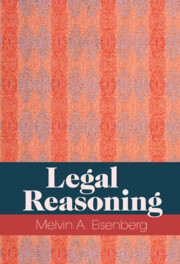Book contents
- Legal Reasoning
- Legal Reasoning
- Copyright page
- Dedication
- Contents
- Preface
- 1 A Brief Introduction to the Common Law
- 2 Rule-Based Legal Reasoning
- 3 Reasoning from Precedent and the Principle of Stare Decisis
- 4 How It Is Determined What Rule a Precedent Establishes
- 5 Reasoning from Authoritative Although Not Legally Binding Rules
- 6 The Role of Moral, Policy, and Empirical Propositions in Legal Reasoning, and the Judicial Adoption of New Legal Rules Based on Social Propositions
- 7 Legal Rules, Principles, and Standards
- 8 The Malleability of Common Law Rules
- 9 Hiving Off New Legal Rules from Established Legal Rules, Creating Exceptions to Established Rules, and Distinguishing
- 10 Analogy-Based Legal Reasoning
- 11 The Roles of Logic, Deduction, and Good Judgment in Legal Reasoning
- 12 Reasoning from Hypotheticals
- 13 Overruling
- Acknowledgments
- Index
13 - Overruling
Published online by Cambridge University Press: 22 September 2022
- Legal Reasoning
- Legal Reasoning
- Copyright page
- Dedication
- Contents
- Preface
- 1 A Brief Introduction to the Common Law
- 2 Rule-Based Legal Reasoning
- 3 Reasoning from Precedent and the Principle of Stare Decisis
- 4 How It Is Determined What Rule a Precedent Establishes
- 5 Reasoning from Authoritative Although Not Legally Binding Rules
- 6 The Role of Moral, Policy, and Empirical Propositions in Legal Reasoning, and the Judicial Adoption of New Legal Rules Based on Social Propositions
- 7 Legal Rules, Principles, and Standards
- 8 The Malleability of Common Law Rules
- 9 Hiving Off New Legal Rules from Established Legal Rules, Creating Exceptions to Established Rules, and Distinguishing
- 10 Analogy-Based Legal Reasoning
- 11 The Roles of Logic, Deduction, and Good Judgment in Legal Reasoning
- 12 Reasoning from Hypotheticals
- 13 Overruling
- Acknowledgments
- Index
Summary
Overruling occurs when a court overturns – abolishes – a rule established in a binding precedent. Overruling may be explicit or implicit. Explicit overruling occurs when a court explicitly abolishes a rule established by precedents in its jurisdiction and replaces it with the opposite rule. If a rule established in a precedent qualifies for overruling, normally a court will explicitly overrule it. In some cases, however, instead of explicitly overruling the rule, a court implicitly overrules it by the process of transformation, in which a court purports to follow a rule while actually undoing it.
Overruling is guided by a principle that is implicit in the case law. Under this principle a common law rule should be overruled if it is substantially incongruent with social morality, social policy, and experience; if it is inconsistent with other, sound rules; if it has been riddled with inconsistent distinctions; or if it is manifestly inequitable and unjust; and if the value of overruling the rule in question exceeds the value of retaining it.
- Type
- Chapter
- Information
- Legal Reasoning , pp. 98 - 110Publisher: Cambridge University PressPrint publication year: 2022

